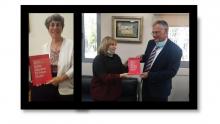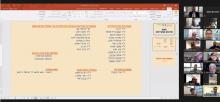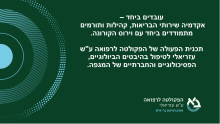Faculty News
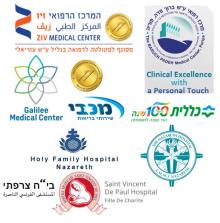
Fourth Meeting of Affiliate Medical Centers and Azrieli Faculty
תאריךThe forum of Azrieli Faculty of Medicine affiliate medical centers held their fourth meeting with Faculty Deans on June 29, 2020, this time hosted by the Ziv Medical Center. The forum has been meeting for two years, each time at a different location, to discuss common endeavors. In the face of COVID-19 restrictions, the following medical centers participated, either via representatives visiting Ziv, or via Zoom:
Ziv Medical Center in Safed (Dr. Salman Zarka, Dr. Dana Krupik)
The Galilee Medical Center in Naharia (Dr. Masad Barhoum)
Baruch Padeh Medical Center in Poria (Tiberias) (Dr. Hagar Mizrahi)
The EMMS (Scottish) hospital in Nazareth (Dr. Fahed Hakim)
The Holy Family Hospital (Italian) in Nazareth (Dr.Ibrahim Harbaji)
The French Hospital in Nazareth (Dr. Nael Elias)
Kupat Holim Clalit Northern Branch (Dr. Mordechai Dayan)
Kupat Holim Maccabi Northern Branch (Dr. Rizan Sakhnini)
The following Azrieli Faculty leadership were in attendance: Prof. Karl Skorecki, Prof. Eric Shinwell, Prof. Chaim Putterman, Prof. Johnny Younis, Prof. Tzipora Falik- Zaccai, Prof. Daniel Glikman, Prof. Ofer Amir, and Mr. Noam David Reschelbach, administrative head of Faculty.
Azrieli medical students benefit from clinical education at these centers, and joint research projects are carried out between the institutions.
Numerous “hot button” issues were covered in a constructive discourse.
These ranged from the impact of the COVID-19 pandemic, to expansion of the Faculty and others.
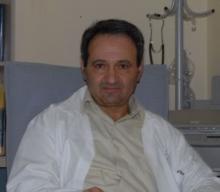
Congratulations to Prof. Jamal Zidan on New Appointment
תאריךProf. Jamal Zidan was very recently appointed as member of the National Statutory Ethics Review Board for Research in Human Subjects of the Ministry of Health. Dean of the Azrieli Faculty of Medicine, Prof. Karl Skorecki, shared his congratulations: "The appointment reflects the high professional and academic level you have achieved, and brings respect to our Faculty and of course to Ziv Medical Center. I have no doubt that your contribution to the most important discussions in the committee will be of the utmost importance, for the promotion of ethical research and for the benefit of public health."
Prof. Jamal is Chairman of the Azrieli Faculty of Medicine Council and Full Professor Clinical at the Faculty. He also serves as head of the Oncology Division at the Ziv Medical Center in Safed, an Azrieli Faculty of Medicine affiliate hospital. He is active in clinical and basic science research, mainly translational.
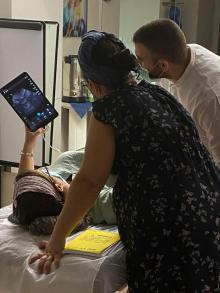
Russell Berrie Foundation Grant Recipients Learn POCUS
תאריךOn June 19, 2020 Azrieli Faculty of Medicine students (here), as part of their work in the Faculty’s Covid-19 project (here) thanks to the generosity of the Russell Berrie Foundation, were trained in the use of POCUS - Point of Care Ultrasound. These students will assist clinics in the North of Israel, as medical professionals grapple with Covid-19 and the populations' chronic health issues.
POCUS is a small, handheld ultrasound device that can be easily and very effectively used real-time, on the spot, to help with immediate diagnosis and patient care. It is currently being used, for starters, along with Family Medicine physicians, at Clalit and Maccabi clinics in Nazareth.
Nazareth Towers, directed by Dr. Yussuf Aouni, hosted the training which was led by Dr. Batsheva Tsadok and Dr. Dana Krupnik. Dr. Mahmud Atamla, director of emergency services at the Holy Family Hospital (Italian) in Nazareth also facilitated the training.
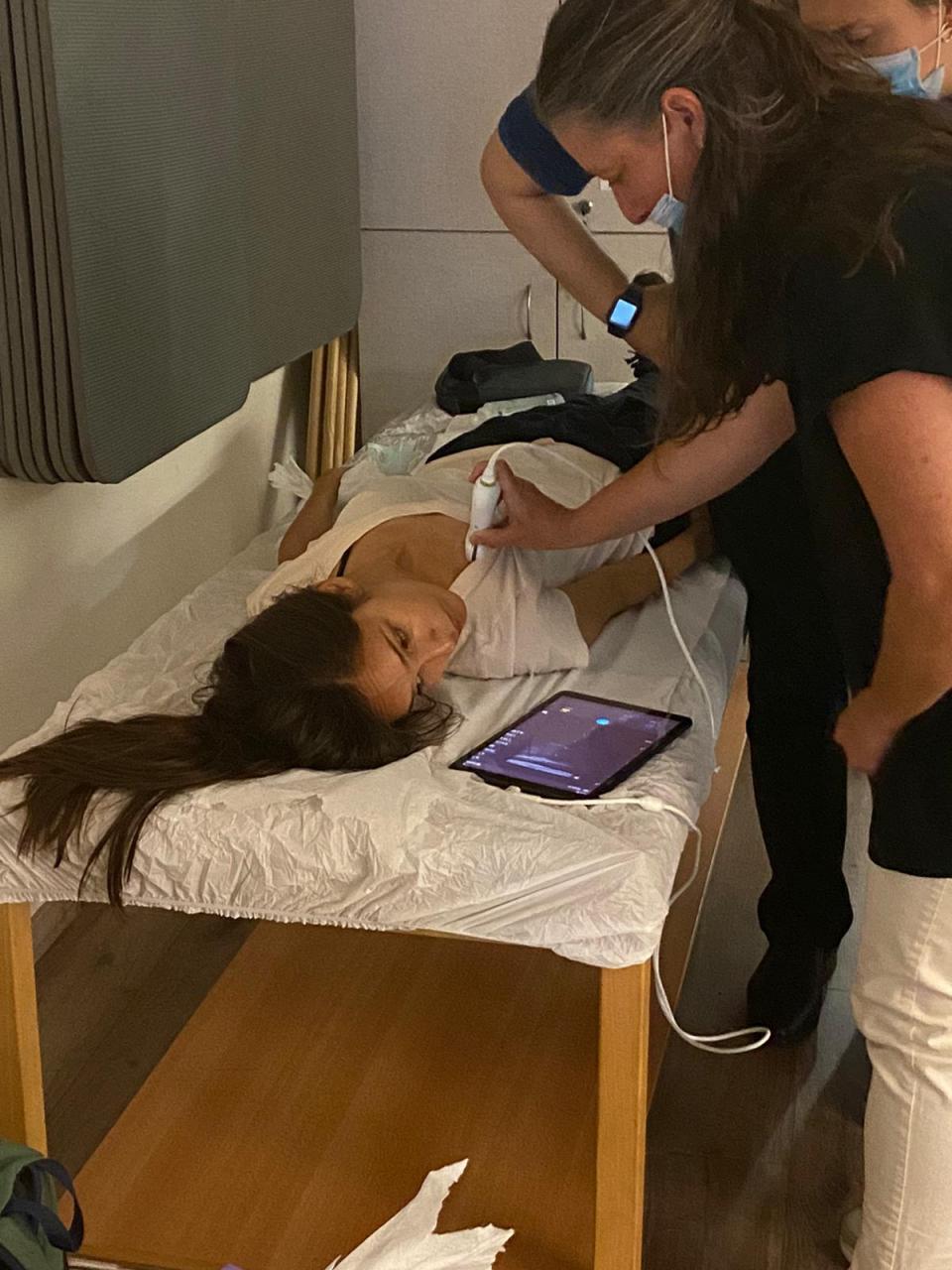
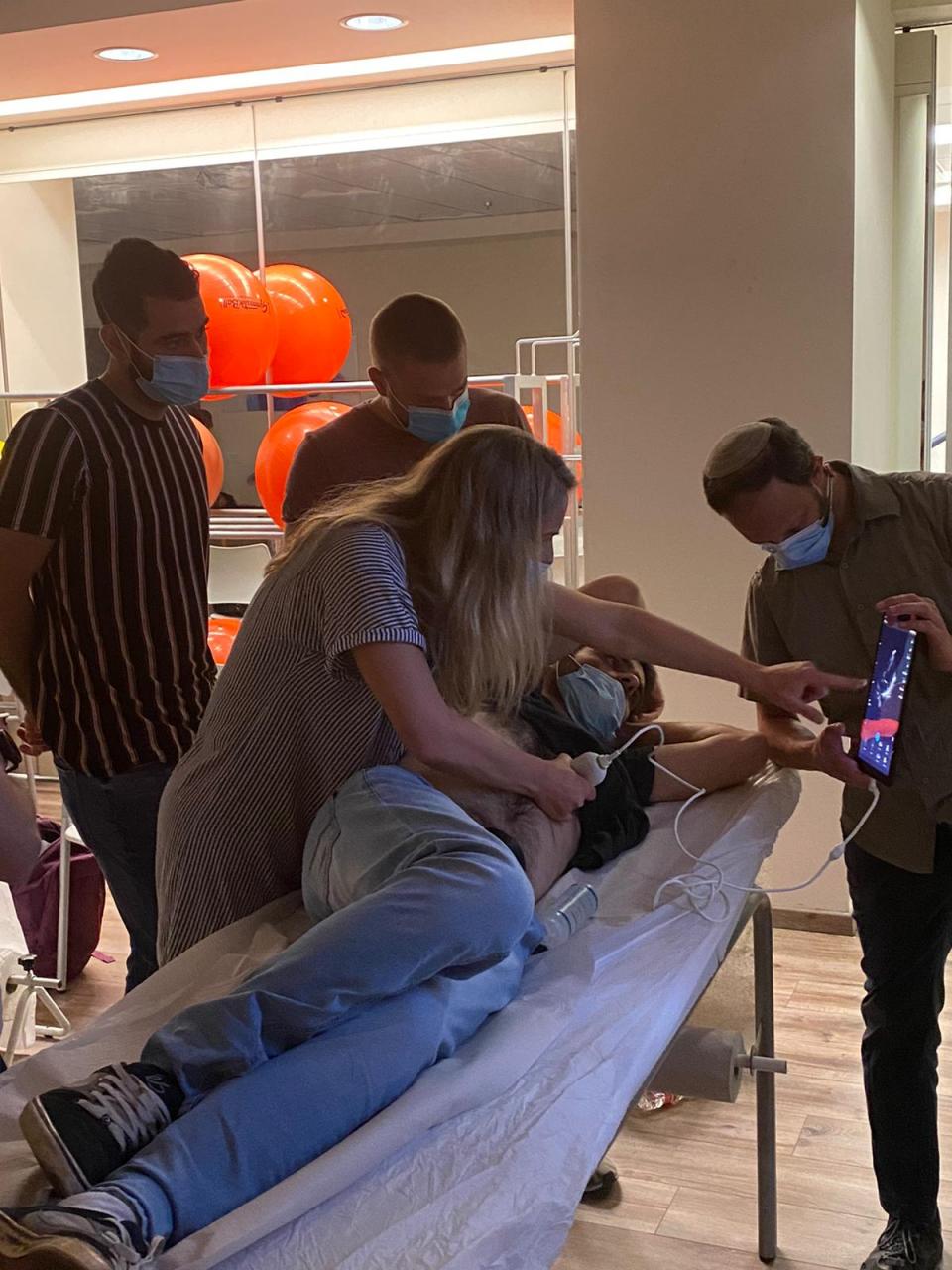
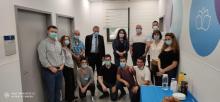
Dean of Faculty Visits Medical Students Assisting in Clinics in North: Russell Berrie Foundation Grant Making a Difference
תאריךAs a follow up to our previous item, “Russell Berrie Foundation Supports Azrieli Students in the Fight Against Corona,”, on June 16, 2020, Prof. Karl Skorecki, Dean of the Azrieli Faculty of Medicine; Dr. Lilach Malatskey, Vice Dean for Community Education; and Dr. Sivan Spitzer-Shohat, Head of Population Health Education and lead on this project, visited our students at work at the clinics in the North. By way of reminder, almost as soon as we realized that Covid-19 had become the new reality, the Faculty approached The Russell Berrie Foundation which immediately stepped to the plate, funding a project to send Azrieli Faculty medical students to the field to assist medical professionals in community clinics.
Deluged with work – dealing with longstanding chronic issues as well as new Covid-19-related concerns and emergencies – the local medical establishment was hard pressed to keep pace with the growing demand of the local population. The students filled an important void (and gained invaluable experience on the way!) and we would like to share some of their sentiments:
“Every medical student should do this project…you learn first hand what is needed in the field. We have never had such an opportunity.” (Dudi, third year medical student, Clalit Health Services Northern Region, Safed clinic)
“In my opinion, this project should be part of the medical training program. The activity at the clinic awarded me the opportunity to see the entire process, even before one gets to the hospital. I better understand the community, something that was lacking before the project…. Explaining to and negotiation with the patient is very challenging. They are not always interested, and don’t understand what you want from them. This was my first experience trying to understand how to deal with this.” (David, third year medical student, Maccabi Health Care Northern Region, Kiryat Shemona clinic)
“Thanks to this opportunity, I was able to discover the difference between what the patient is requesting, and what s/he really needs, based on their medical background. We can then prevent a deterioration in their medical condition…I feel that my ability to talk to patients and convince those who do not care about their medical condition has improved. I have discovered barriers that I never understood. For example, it never dawned on me that the cost of medication would prevent patients from taking care of themselves, but I discovered this in discussions that came up at the clinic.” (Yossi, fourth year medical student Maccabi Health Care Northern Region, Tiberias clinic)
“We can help patients who are unaware of their condition. I feel like I am making a difference. I explain what symptoms mean, things they previously did not understand….This is one advantage of Family Medicine; there is a long-term relationship (as opposed to that at hospitals, for example, dealing with acute immediate needs). I feel the difference, that at the clinic, the patients really appreciate and thank you.” (Shawn, third year medical student, Maccabi Health Care Northern Region, Safed clinic)
We salute all health care workers and wish everyone good health.
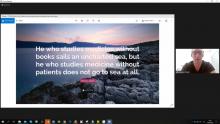
Certificates of Appreciation Awarded to Clinical Instructors, Medical Centers in Nazareth and the North, June 18, 2020
תאריךTwo impressive and well-planned online Zoom ceremonies were again held, on June 18, 2020, to thank excellent clinical instructors and award them certificates of appreciation. This follows ceremonies previously held honoring instructors at the Ziv Medical Center in Safed, the Baruch Padeh Medical Center in Poria, and the Azrieli Faculty (for pre-clinical instruction). The awards were based on student survey feedback under the direction of Dr. Nomy Dickman, Head of Unit, Evaluation and Advancement of Education.
Moderated by Mr. Noam David Reshelbach, the administrative head of the Faculty, senior management offered a few words. The following institutions were represented:
- Kupat Holim Clalit (North)
- Kupat Holim Maccabi (North)
- Kupat Holim Leumit (North)
- Mazor (Mazra) Mental Health Center (Acco)
- Lady Davis Carmel Medical Center (Haifa)
- The Medical Corps of the IDF
- Emek Medical Center (Afula)
- Galilee Medical Center (Naharia)
- EMMS (Scottish) Hospital (Nazareth)
- Holy Family Hospital (Italian) (Nazareth)
- French Hospital (Nazareth)
Prof. Karl Skorecki, Dean of the Faculty, mentioned that he visited students at work in the community, and how critical and appreciated community medicine is. He quoted one of the students as saying, “Here we do REAL medicine! I learn but also influence.” – and that the Faculty relies on – and is grateful for – the physicians in the field to teach, train, and above all, mentor the students. He also warmly thanked the institutions that are not affiliated with the Faculty but that accept and train medical students as part of their family. He also offered a personal anecdote, that the first Israeli city he was exposed to was Nazareth, as a teen visiting Israel. He shared that there will always be a special place in his heart for Nazareth. He pointed out that one’s religion is not what counts – that all religions have a mission to care for others, and that it is poignantly felt in the area hospitals. He also pointed out, with pride, that this is the first ceremony to include the IDF, represented by IDF Medical Chief Col. Elon Glassberg.
Prof. Eric Shinwell, Associate Dean for Medical Education, again pointed out how impressed he was with how quickly the medical establishments thought on their feet as soon as the Coronavirus erupted. He applauded everyone’s ability to think out of the box. He expressed his sincere hope that the State of Israel will find a way to increase the number of desperately needed doctors in the country.
Dr. Ziv Rosenbaum, of the Emek Medical Center, said that health and education are crucial for a functioning democracy. He shared that coming from the Center, he was impressed with the special human touch prevalent in the North.
Dr. Fahed Hakim of EMMS shared warmly how important the students are to his hospital, that they are the future. He expressed his hopes that they will remain in the North after their training to continue contributing.
Dr. Ibrahim Harbaji of the Holy Family Hospital said how proud he is of his doctors, that the challenge of teaching should not be taken for granted. His hospital is a mosaic, he described, with the prevalent language spoken being Arabic, except for when students arrive, at which point all respectfully switch over to Hebrew. The bottom line, the common language, mentioned one of the award recipients, is giving.
Dr. Lilach Malatskey, Vice Dean Community Education, expressed her hopes that her vision will come true – that with the improvement of community medicine, not only will excellent doctors move to the North, but citizens too. Connecting is important, and she looks forward to re-connecting in person once Corona passes.
Dr. Tsofia Eilat-Tsanani, a specialist in Family Medicine, thanked all for their hard work, and stressed that family medicine calls for personal accompaniment.
Dr. Nomy Dickman reiterated that this ceremony is a highlight of all of the Faculty’s efforts, proving yet again how teaching, learning, and evaluation go hand in hand. Instructors do not merely pass on information; they are mentors. And the best type of learning is active learning.
Dr. Jonathan Orrelle who represented the award recipients, brought in a quote from Sir William Oster that sums it all up: “He who studies medicine without books sails an uncharted sea, but he who studies medicine without patients does not go to sea at all.”
Congratulations to all, and we look forward to meeting next year in person!
Pictures can be seen here.
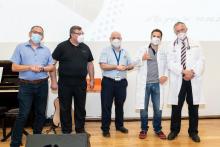
Four-Year Track White Coat Ceremony
תאריךAnother class of four-year-track students (those who entered medical school after successful completion of a BA/BS degree) convened on June 10, 2020 to receive their white coats in the legendary White Coat Ceremony. With Covid-19 looming, the exact venue was uncertain until the last moment, as previous recent ceremonies had been held via Zoom, and original plans were to congregate outside, in the Faculty parking lot. Alas, with two days planning, thanks to the dedicated and organized efforts of the administrative staff, the ceremony ultimately took place in the Esther & Haim Carasso Auditorium. Administration, course coordinators, and instructors were present in the Auditorium while students remained in classrooms in groups until called, and some 300 family and friends viewed via Live YouTube.
This was the eighth Azrieli medical school class, over 70 students. After two years of pre-clinical studies at the faculty, the students will now enter the clinical phase of their studies, in regional hospitals and clinics.
Emceed by Noam Reshelbach, the administrative head of the Faculty, Dean Carl Skorecki opened with a humorous, timely speech, reminding the viewers of the history of medical training - and even dressing up as a doctor from the distant past, during previous epidemics. He likened the beak mask of past to the current surgical mask, and the burning of incense to Alcogel! Prof. Skorecki then stressed over and over again, the importance of human contact between physician and patient, team work, honestly, active listening, and compassion.
Prof. Eric Shinwell, Associate Dean for Medical Education spoke next, explaining the transition from passive to active learning and the importance of active learning for internalization. He offered a tip: always find an interesting patient, because much can be learned from them. Utilize quiet "down time" for exploration and self-edification.
Prof. Daniel Glikman, Vice Dean, Pre-Clinical Studies, came to the podium next. He brought in a parallel to a rock group. Just as we rarely see, or are even aware of, all that is involved behind the scenes - we should never forget, and thank, the administrative staff who make it all possible. He then thanked everyone by name and expressed warmest appreciation to the educational staff, for giving the inspiration. In the end, he said, each student will develop their own style.
At this point each student, one by one, by class, was invited to the stage to receive their White Coats and pose for a photograph with those who made it possible. It was pointed out that at the next ceremony they will be called "Doctor."
A video greeting sent by two instructors currently in Holland (Dr. Karin Prins and Dr. Michael DeVries) was viewed next.
A lovely musical interlude by four students followed, then the presentation of certificates for scholarships of excellence of the Edwina and Paul Heller Memorial Fund and the Dr. Helena Rosenkranz Fund.
The podium was then turned over to two students, Noa Frishman Marciano and Amirit Luder, who carried the evening onwards. They started with a fifteen minute video comprised of memorable moments shared by the students. Then a parent spoke via video to the crowd, the student choir performed, gifts of appreciation were given to staff, and the student representative Avinoam Nahshon shared a few words. The two-hour ceremony concluded with the singing of the national anthem, Hatikvah (and much excitement!).
Pictures can be seen here.
New Book! Active Education for Future Doctors (Nomy Dickman and Barbara Schuster, Eds.)
תאריךFrom the Back Cover:
This book is designed to aid the faculty of medical and other health related schools in developing the pedagogical skills to transform their teaching in multiple settings including the classroom, the conference room, the ambulatory office, and the hospital from a passive learning experience to an active learning experience. In this transformation, the teacher morphs from the ‘all knowing expert’ to the ‘learning facilitator and coach’. After a brief review of adult learning theory the remainder of the book will focus on a broad variety of teaching techniques and classroom activities that ‘flip’ the classroom from a passive to an active learning environment. In addition to condensed explanations of each of the techniques, examples of each process will be presented with suggestions for flexing the techniques to better accommodate a variety of learning settings and a diversity of learners.
- Edited and written by active educators practicing in various fields, providing diverse perspectives on the broad range of methods of active learning.
- Provides practical examples to implement various methods of active learning.
- Presents flexible techniques to complement the discussion of teaching elements and components.
About the Editors:
Nomy Dickman is currently the head of the unit for Development and Evaluation of Education at the Azrieli Faculty of Medicine. She received her Ph.D. in Science Education from the Technion - Israel Institute of Technology in Haifa.
Barbara Lynne Schuster, MD, MACP, is a Clinical Professor in the College of Pharmacy at the University of Georgia, and an affiliated Professor in the School of Public Health at the University of Haifa.
Table of Contents:
- Back to the Future: Changing the Education of Medical Students - Dickman, Nomy (et al.)
- Preparing Teachers and Learners - Schuster, Barbara
- Giving a Great Lecture: Going from Fine to Fantastic - Gilbey, Peter
- Active Teaching–Active Learning: Methods and Variations - Dickman, Nomy (et al.)
- Clinical Teaching: The Bedside and Beyond - Eilat-Tsanani, Sophia
- Assessment of Clinical Education - Luder, Anthony
- Medical Humanities and Active Learning - Bentwich, Miriam Ethel
- The Power of Experiential Learning in Essential but Challenging-to-Teach Subjects - Spitzer-Shohat, Sivan (et al.)
- Crossing the Cultural Chasms - Bisharat, Bishara
- Students as Near-Peer and Peer-Teachers - Karasik, David (et al.)
- Interprofessional Education - Shinwell, Eric
- Developing Lifelong Learners - Schuster, Barbara
- The Ethics of Teaching - Weingarten, Michael A.
To purchase, go to Amazon or Springer.
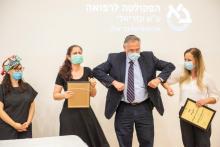
Certificates of Appreciation Awarded to Faculty Instructors, June 7, 2020
תאריךAfter two recent ceremonies via the Zoom platform (here and here), the Azrieli Faculty of Medicine was able to arrange another award ceremony, this time in person, to thank excellent Azrieli Faculty instructors. Keeping to required social distancing rules, and donning surgical masks, the participants convened on June 7, 2020 in the Esther & Haim Carasso Faculty Auditorium. The ceremony was also aired on YouTube live.
Chaired by the administrative head of faculty, Noam Reshelbach, the first to approach the podium was Dean Carl Skorecki. Excited this time to be speaking "live," Prof. Skorecki tied in education to the book of Ruth, recently read during the holiday of Shavuot. He pointed out the lesson we learned from Covid-19 about the importance of rigorous science, that learning must also have a research component.
Prof. Eric Shinwell, associate dean for medical education, pointed out that the awards are actually based on last year's surveys and expressed his hope that next year we will not be hampered by Covid-19 and will be able to "catch up"! He applauded teachers and students alike for being able to think on their toes and do an almost immediate paradigm shift in terms of teaching, with the new restrictions. Excellence, he said, is being able to lead and adapt in emergency situations.
Dr. Meital Gal-Tanamy who heads the advanced degree program, quoted from William Yeats. She then brought up a Rashi commentary on the weekly portion, Beha'alotcha, regarding lighting fire - in the weekly reading, the actual torch, and in education, the fire of enthusiasm. In both cases, the process must be carefully watched by the leader, to make sure the fire has effectively spread, and only then should s/he step back. She then read complimentary student comments, and thanked all.
Dr. Nomy Dickman, head of the educational evaluation and advancement unit, pointed out the symbiotic relationship between teaching, learning, and evaluating. She pointed out that the ceremony is a highlight of Faculty activity.
A third year medical student performed pieces by Chopin and Liszt, then each award recipient was called by name to receive his/her certificate of appreciation.
For excellent teaching, advanced degree courses:
Dr. Evan Elliot
Dr. Itay Onn
Dr. Keren Agay-Shay
Dr. Moshe DessauFor excellent teaching, pre-clinical four-year track courses:
Dr. Orly Avni
Dr. Jumanh Essa Hadad
Dr. Meital Gal-Tanamy
Dr. Sivan Spitzer-Shohat
Dr. Alon BarashFor excellence as pre-clinical course coordinators:
Dr. Moshe Dessau and Dr. Sergio Zvalb
Dr. Orly Avni and Dr. Meital Gal-TanamyPictures can be seen here.
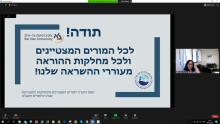
Certificates of Appreciation Awarded to Clinical Instructors, Baruch Padeh Medical Center in Poria, June 4, 2020
תאריךThe second Zoom-platform ceremony for outstanding clinical instructors and departments was held on June 4, 2020, this time for excellent doctor-educators at the Poria Medical Center. The Coronavirus did not prevent the Azrieli Faculty of Medicine from thanking those who deserve it!
With Noam Reshelbach, administrative head of the Faculty serving as "master of ceremony," Prof. Karl Skorecki the Dean, opened with warm words of appreciation. He pointed out than a large percentage of vice deans at the Faculty hold positions at Poria, and mentioned that Poria joins the Faculty in placing the health of the citizens of the Galilee at the forefront. Skorecki blessed the medical center for its excellent clinical work, as well as research accomplishments, all supported and encouraged by the excellent leadership at Poria. He noted that it was clearly evident that the doctors love teaching, as one must love what one does in order to truly excel. He stressed teaching by example, the importance of mentorship, and reiterated that although Azrieli is called a "Faculty," bottom line is that it is a medical school, training future doctors.
Prof. Eric Shinwell, Associate Dean for Medical Education, spoke next, pointing out the unique recent challenges with the sudden novel Coronavirus reality. Students and teachers alike shifted and adapted immediately - and the excellent results were apparent.
Dr. Nomy Dickman, Head of Unit, Evaluation and Advancement of Education, pointed out how teaching, learning, and evaluation all go hand-in-hand. Excellence is part of the organizational culture, and she thanked all involved for their dedication.
Dr. Hagar Mizrahi, who currently serves as director of the Medical Center, stressed that excellence is a way of life, that the medical center cares not only for its patients but also for its students - and thanks them. She thanked the doctor-educators who have chosen to find the time not only to heal but to teach and be role models.
A short inspirational video of thanks had been prepared and was shown, with final words by Dr. Said Abu Zaid of the department of pediatrics (awarded excellent instructor, department, as well as unit). He thanked all, including the administrative support staff, for making the success possible. He termed medicine a lifelong mission. Prof. Skorecki then reiterated, "And the secret key is to love what you do."
Certificates of Appreciation Awarded to Clinical Instructors, Ziv Medical Center in Safed, June 3, 2020
תאריךA ceremony for outstanding instructors was held for the first time via Zoom, due to Coronavirus restrictions. Mr. Noam Reshelbach, the administrative head of the faculty, chaired the event and called speakers to the Zoom-podium:
Prof. Karl Skorecki, Dean, stressed that although we are called a Faculty of Medicine, we are actually a "School" of medicine, with the value of education at the helm. Quoting from the scriptures and Talmud. he pointed out that in the Jewish tradition, teachers are held with the highest regard, and are also considered the parents of those whom they mentor. He also mentioned the importance of educators teaching by example.
Prof. Eric Shinwell, Associate Dean for Medical Education, pointed out the challenges that the Faculty faced since the outbreak of Corona, most especially in the realm of teaching - and how everyone pulled through with flying colors. Pre-clinical studies switched over to the Zoom platform in one day, and clinical studies quickly found viable solutions, so as not to lose valuable time and continuity.
Dr. Nomy Dickman, Head of Unit, Evaluation and Advancement of Education, pointed out that this is a climactic moment, showing how the teacher-student relationship is symbiotic, that both sides learn and benefit from one another.
Dr. Salman Zarka, director of the Ziv Medical Center and close colleague at the Faculty shared his blessings, stressing the word "excellence." He mentioned that recipients of this honor will receive a special ribbon to be worn on their uniforms while working at the hospital, and that they can and should be proud of their achievements.
All names were called out individually (see picture attached, in Hebrew) then Dr. Ron Katz of Ziv, one of the recipients, spoke briefly about his enthusiasm to teach, and how teaching is not just a profession but a way of life.
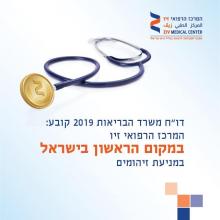
Ministry of Health Ranks Ziv Medical Center First in Prevention of Infectious Diseases
תאריךWe are proud of our affiliate hospital, the Ziv Medical Center in Safed!
A 2019 Israeli Ministry of Health report has announced that the Ziv Medical Center in Safed, an affiliate hospital of the Azrieli Faculty of Medicine, has ranked first place among all Israeli public and governmental hospitals and the Clalit HMO, for the prevention of infectious diseases.
This is not by chance. The Ziv Medical Center has made this battle a priority, especially considering the new Covid-9 reality. The 2018 report placed the Medical Center seventh. Hard work has paid off, and has proven the hospital a safe place for those seeking treatment and hospitalization.
Dr. Shimon Edelstein who directs the Unit for Infectious Diseases and Prevention stated, "This is a great achievement, as it is a result of hard, sustained efforts of the Unit, including a long tradition at the hospital of placing the patient's safety first. We stress clean hands, disinfecting, and distancing contaminants from our patients."
Dr. Jalal Tarabeia, the Center's clinical epidemiology supervisor, added, "Infection prevention has become part of the organizational culture, for all staff members. This success, at the national level, would not have been possible if not for education, constant monitoring, feedback, and built-in QA."
Dr. Salman Zarka, director of Ziv Medical Center, is especially proud, and congratulated the diverse staff. "This report shows the patients and visitors who have complimented us on the hospital's cleanliness - that this goes deeper than what is apparent to the naked eye. Covid-19 has taught all of us new rules, most especially that each and every one of us plays a part in the prevention of infectious contamination. We must all continue to wear masks that cover the mouth and nose, be scrupulous about keeping our hands clean, and keep social distance."
It's a Joint Effort: Academia, HMOs, Community, and Donors Fighting the Coronavirus
תאריךThe novel coronavirus, Covid-19, has taken us all by surprise and is challenging health systems worldwide. It is also showing us how population groups are being affected differently. The Galilee region in Israel exemplifies this most poignantly. The diversity of vast ethnic and religious as well as socioeconomic backgrounds, coupled with limited accessibility to medical services and advanced medical care, and a high rate of chronic illness – is proving particularly challenging for caregivers.
Bar-Ilan University’s Azrieli Faculty of Medicine has joined together with its partners, affiliate hospitals, community clinics, NGOs, foundations and donors to build a new platform to rise to the challenge.
Prof. Karl Skorecki, Dean of the faculty, explains: “As a Faculty whose mission is to train excellent doctors, who are dedicated to their community, we have built a three-tiered approach that will answer not only to the current urgent needs, but will build and strengthen the structure for our activity in the Galilee."
A result of roundtable discussions, this platform has begun, led by students and faculty alike.
The biological aspect – Supporting and improving the ability of the authorities in the area to do testing
The psychosocial aspect – Students from the Faculty supporting NGOs with follow up on chronic patients in order to minimize physical and emotional decline resulting from lack of control. This will continue even after the epidemic.
In addition, the Faculty is improving the medical infrastructure by placing ultrasound stations, and training additional clinical staff in the affiliated hospitals and community health centers. The staff will be trained in the operation of the instruments, analyzing the patient's status, and referring them to the hospital if and as needed. The staff will continue even after the pandemic, incorporating all they have learned for ongoing patient care.
This win-win situation serves to advance the health of the patient and the education of the medical students.

Dr. Ayelet Shai Becomes Member of the National Council for Prevention, Diagnosis & Treatment of Cancer
תאריךThe Azrieli Faculty of Medicine congratulates our Dr. Ayelet Shai (head of oncology at the Galilee Medical Center in Naharia) on her important appointment as member of the National Council for Prevention, Diagnosis & Treatment of Cancer, of the Israeli Ministry of Health.
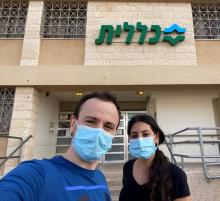
Russell Berrie Foundation Supports Azrieli Students in the Fight Against Corona
תאריךThe novel Coronavirus, Covid-19, took us all by surprise. At the Azrieli Faculty of Medicine especially, we had to act fast. The Galilee, with its noticeable health disparities, was a source of major concern for the Covid-19 outbreak. We quickly created a roundtable with our community partners and affiliated hospitals and HMOS, and luckily, with the generous support of the Russell Berrie Foundation and the enthusiastic dedication of our medical students and staff, we were able to make a noticeable change in the Galilee and north of the country.
“What started as an emergency has actually morphed into a chronic situation,” explained Dr. Sivan Spitzer-Shohat who spearheaded the endeavor. “At the Faculty we have always dedicated ourselves to being socially accountable to our community, and this is a perfect example. It has also proven to be an excellent teaching and learning opportunity.” Under the new project, medical students are sent to the field – primary care clinics across the Galilee community – to reinforce the medical establishment in the north during this crisis. So far, 60 medical students have been placed in clinics. Among other tasks, they follow-up on chronic patients via telephone calls and home visits, filling a crucial void. About 20 more students will be added in the second phase.
In the past, medical students have expressed difficulties emanating from cultural differences with the local population, and lack of understanding; this project opens up the lines of communication for not only the patient, but also the practitioner. By stepping out of their comfort zones, it is proving to be a learning experience for all involved, bridging gaps while also offering critically necessary and urgent medical services. The students are learning alongside chronic care management, cultural competence practice, and the population is gaining from the increased presence of medical personnel who are there to treat as well as educate.
Prof. Skorecki, the Dean of the Faculty, also expressed his enthusiasm for this endeavor, adding, “This has proven to be an excellent opportunity to create a long-term platform with our community partners to improve the health of the Galilee.”
Thanks to the Russell Berrie Foundation, we can see some positive outcomes of Covid-19! This new project, born out of an acute immediate need, will ultimately serve the long-term chronic medical needs of the Galilee and north of the country.
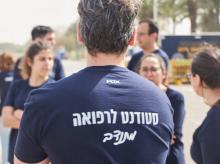
Azrieli Students Helping to Fight Corona
תאריךAzrieli Faculty students – like all of us – are adapting to the new reality, Covid-19. On March 13, 2020 a call for volunteers went out and Azrieli medical students indeed jumped right in.
Magen David Adom quickly trained the students in how to properly protect themselves and do Corona testing. Then, with a rental car, they began their work on March 15, 2020. Activity grew and grew, until eventually the national Corona "drive ins" were set up, and the IDF stepped in with a fresh source of manpower. Omri Cohen, a three-year track student who was at the helm of the initiative, mentioned how challenging the beginning was, with endless work, but how at some point everyone functioned "on autopilot." He tells of doing testing at a Bnei Brak old age home after Pesach, and struggling with the cultural challenges and physical discomfort of the protective gear.
Some students found themselves helping out at a local hospital, doing triage at the ER, and others working with the elderly who live alone at home. Those with lab experience were recruited to help in the laboratories. And of course, "Physicians Assistant" has become a household word, with the Ministry of Health calling on medical students to help out professionally in this capacity with the epidemic.
Pre-clinical studies have continued, albeit online, and even solutions to online clinical learning are being initiated, in order to continue keeping pace with the academic requirements and not lose previous time.
In the beginning, many students found themselves asking many questions, due to the uncertainty – should I be leaving my apartment in the north? Where should I spend Pesach, risk my family's health if I go home? But a new rhythm seems to be falling into place.
As Omri Cohen said, "We are a country that is used to emergencies. We are fighters. This is just another war we are fighting, and I feel like I am in miluim [reserve duty]."
We wish them health and success in their studies and endeavors.
Photo credit: דין אריאל, התאחדות הסטודנטים לרפואה בישראל



